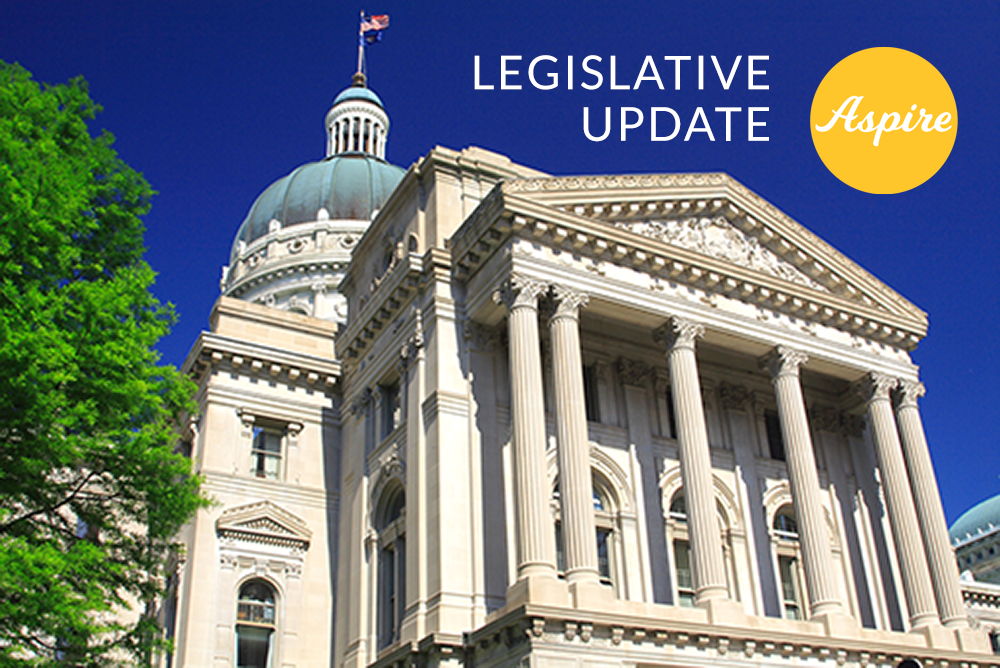Statehouse Update: Broadband Bills Racing to Finish Line, Constitutional Argument to Court?

The 2021 legislative session is quickly approaching the finish line. As a reminder, legislative leadership moved the anticipated sine die date (“without day,” or without assigning a day for further hearing) from April 9 until April 21. This subsequently advanced the timetable for bills to make it out of committee to this Thursday. Some committees have already held their final meeting and others only have one remaining (this week). The Senate Appropriations Committee took public testimony on the budget bill last Thursday.
Showing signs that the general assembly is already starting to conclude its work, one conference committee was already held last Wednesday (HB 1123) (conference committees are small groups of legislators assigned to reconcile the differences in a bill’s language between what passed in the House and Senate). And daily session calendars are filling up with concurrences (the vote conducted by the full House or Senate to accept, or concur with, the changes made to a bill by the other chamber after it passed the first chamber).
Here are some updates on top Aspire issues. We will end with the Indiana constitutional argument we believe may end in the Indiana Supreme Court.
Broadband: Funding and Infrastructure Bills Racing to the Finish Line
HB 1449, which prioritizes state funding for broadband projects to rural areas, schools, and clinics, and raises the definition of broadband speeds, passed unanimously through the Senate. The bill was returned to the House with amendments, so the next step is either a concurrence vote or conference committee.
The three Senate broadband bills (SB 352, SB 359, and SB 377) were heard in the House Utilities Committee last week. SB 352 deals with INDOT and broadband infrastructure in rights-of-way, and SB 359 introduces a new concept of local governments issuing broadband bonds to be repaid by the service provider rather than through new taxes. SB 377 deals with accountability for broadband projects that receive state grants.
Aspire has been tracking each of these bills all session. And, as we have done before, we sent a letter to their respective hearing committees in support of each of these bills. Each passed committee. SB 352 and SB 359 then passed second reading on the House floor and are eligible for final vote this week. SB 377 is still on the second reading calendar.
Smoking Cessation: Senate Pulls Cigarette Tax Increase
Senate Pro Tempore Rod Bray publicly stated last week he expects the cigarette tax increase to be removed from the Senate version of the budget, but that the e-cigarette/vaping tax will likely remain. Aspire sent a letter to the Senate Appropriations Committee in support of keeping the increase passed in the House version of the budget. The final hearing will be this Thursday. We believe this bill will go to conference committee no matter if the cigarette tax stays or goes this week, so stay tuned.
As a reminder, Indiana consistently ranks tops as a pro-business environment, but one glaring red mark on our report card remains: our poor public health rankings. The Indiana University Richard M. Fairbanks Foundation estimates Hoosier smoking costs Indiana employers an estimated $2.8 billion annually in lost productivity, smoker absenteeism and reduced work performance.
The Wheels on the Bus
Aspire continues to oppose SB 141, which could partially defund IndyGo and slow regional transit development. It passed the Senate but for a switched vote in committee, which allowed it to then pass the full Senate floor. As of this story’s writing. the House Roads and Transportation Committee has not yet scheduled it for a hearing at this week’s final meeting. Again, the deadline for Senate bills to be passed through committee in the House is this Thursday. However, the bill passed the full Senate meaning the language is considered “live” and eligible to be amended into another moving bill, including in a conference committee. Two weeks is a long time in the life of the Indiana General Assembly. Aspire will continue work with our regional partners to defend against this bill.
Emergency Session Bill Goes to Conference Committee, Governor Says He Will Veto
HB 1123, which would allow the legislature to call themselves into an emergency session under certain conditions and give them oversight of emergency federal funding, passed through the Senate 39-10, but the House dissented to the Senate’s version of the bill. It went to conference committee, where the conferees were the leaders of each of the four caucuses (Senator Greg Taylor, the Senate Minority Leader, has since been replaced by Senator Sue Glick, Republican author of the bill).
The changes made in conference committee were largely technical fixes. Governor Holcomb stated he will absolutely veto the bill if it passes. The legislature is likely to vote on the final version of the bill quickly this week, so that they will have time to override the Governor’s veto before the end of the current legislative session.
The Governor believes the bill does not pass Indiana Constitutional muster. The General Assembly believes it does. Once the General Assembly overrides the Governor’s veto, it will become law. But the matter of constitutionality will remain. As national legal arguments have taught us so well this last year, the third branch of government plays the role of arbiter. We believe this argument will ultimately end up in the Indiana Supreme Court.
The real question: which party will the Indiana Attorney General represent?
